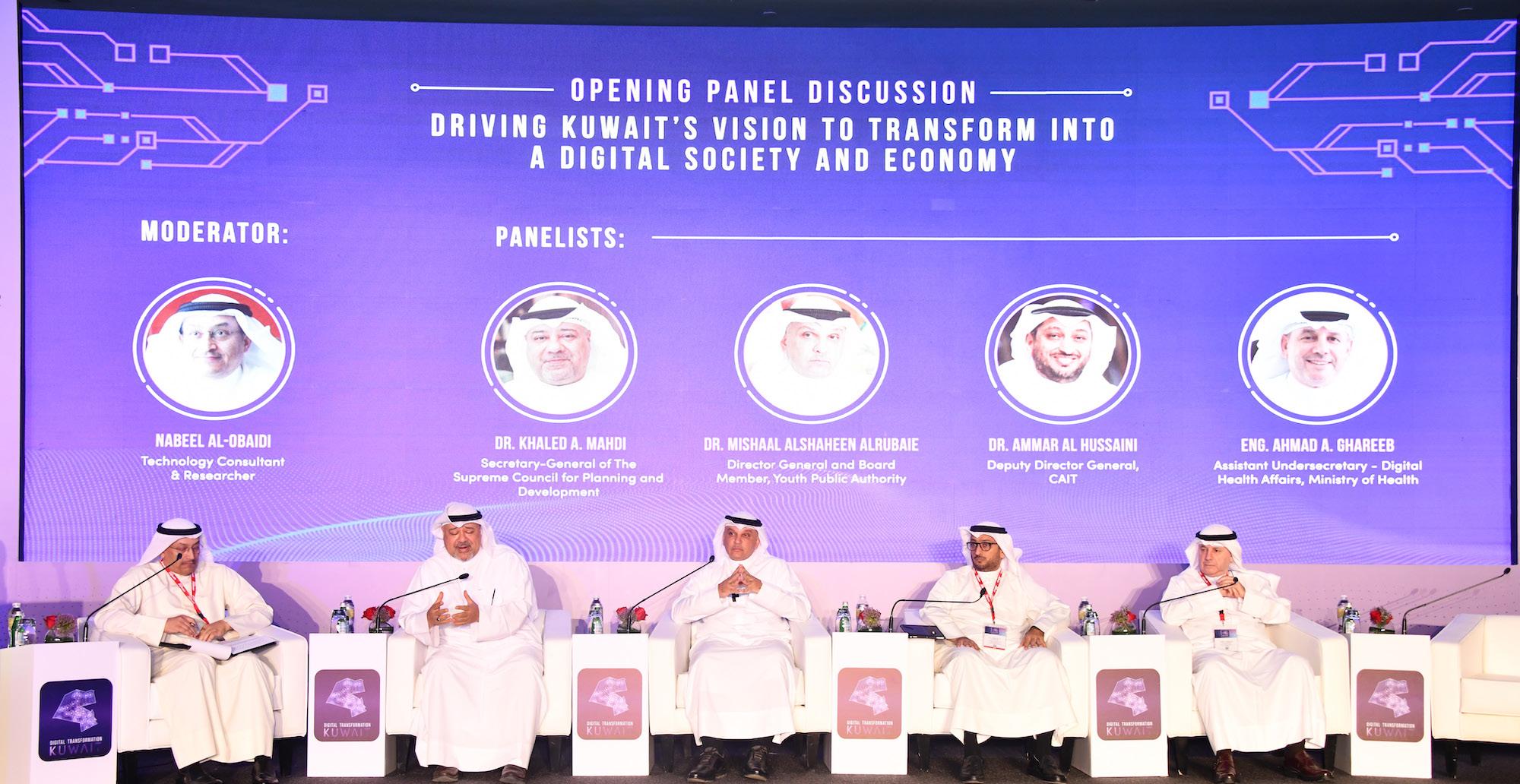
6 minute read
7 WAYS MULTI-CLOUD CAN HELP CLOSE THE INNOVATION-GAP
By: Ahmed Auda Vice President and General Manager, Middle East, Turkey, and North Africa, VMware
The benefits of using technology to innovate and get ahead of the competition are clear, but despite this, few organisations have yet to truly harness the potential of their data.
Advertisement
According to 100 C-suite executives in Forbes Top 2000 companies, surveyed by VMware, nearly three-quarters (70%) of businesses admitted they are struggling to unlock the value of their data – directly impacting their ability to innovate.
Organisations looking to close the gap between originating ideas and delivering them into the business by doing more with their data, should turn their attention to the cloud.
Here are seven ways multi-cloud can help close the innovation-gap – by helping businesses move, store, utilise and thus monetise their data, irrespective of where it resides.
1. EASE OF MANAGEMENT
As customers embrace the multi-cloud model, they discover that greater choice can lead to a big spike in complexity.
Businesses on this cloud journey need to move from being ‘cloud first’ – with a big focus on building customer-facing apps in a single cloud – to ‘cloud smart’- where they have the freedom to choose the best cloud environments for their applications, with consistent management for security and control, and a cost-efficient use of private and public clouds.
2. FREEDOM OF CHOICE
Organisations don’t want to have to plan their entire cloud/IT/digital journey upfront; they want the freedom to adapt as their business needs evolve.
That means having the freedom to adjust data utilisation as required rather having to compromise on decision making by being locked into one cloud. A true multi-cloud strategy enables companies to incorporate the right mix of onpremises, private, public and edge cloud environments to meet their needs.
3. AGILITY
As part of that freedom to choose any cloud, organisations should be able to move both new and existing apps quickly and easily to a cloud, with zero or minimal refactoring. Requirements and services are continuously evolving, and a company’s multi-cloud infrastructure must be able to evolve as well. This also reduces friction linked to the migration of data, allowing the agility required to access and use data flexibly, and at speed.

4. TIME TO VALUE
The nature of business today means workloads must be up and running on any cloud quickly and easily. Being locked into a multi-year contract with a cloud provider and not consuming resources in the way they anticipated, hampers the ability of the business to move quickly. Instead, organisations should be able to consume cloud at the right pace to meet their spend commitment, avoiding wasted expenditure and allowing them to tap into required data sets when needed.
5. SECURITY
Security is a top priority for businesses. Being able to proactively monitor, detect and remediate security across clouds is critical. It should be baked into the platforms that organisations are using in a way that ensures upgrades happen on time, with support to minimise disruption in the event of an attack.

This directly ties into the uptime and resilience required to manage data effectively, across workloads and at all times.
6. SOVEREIGNTY
The distribution and storage of data between organisations and beyond national boundaries has become an obstacle to its protection and utilisation. Having access to a sovereign cloud can provide the guarantees and assurances around these legal requirements, opening up the possibilities of innovation to entire industries that previously had no access to cloud services.
7. FUTURE-PROOFING
No-one knows what new innovation the future will bring, not even two or three years ahead. Businesses need to be agile to respond to evolving opportunities and new challenges.
With a multi-cloud platform, they will be equipped to adapt every part of their organisation as needed, including tech infrastructure and data management capacities, to have those same capabilities.
By deploying a multi-cloud approach, organisations can give themselves the foundations they need to make better use of their data today, and for what’s around the corner, and in doing so, finally close the innovation-execution gap.

Recently we ventured to the `IFS Unleashed' conference in Miami where we learnt from experts how IFS products help companies around the world who manufacture and distribute goods, build and maintain assets, and manage service-focused operations.
The IFS industry specific products are innately connected to a single data model and use embedded digital innovation so that IFS clients can be their best when it really matters to their customers. The IFS products transform operations, work efficiently and liberate staff while IFS Cloud helps to reduce the time, effort, and resource burden while increasing the quality of work and experience.
For instance, the IFS Cloud provides organizations intelligent insights and accelerates automation efforts. The enhancements done continually on products support end-to-end process automation and advanced analytics capabilities that impact organizations across functions.

We ask Mehmood Khan, Managing Director of IFS Middle East South Asia about IFS in the region. Mehmood has over 20 years’ experience in advising companies in digital transformation and new technology. He has played a key instrumental role in growing the IFS business in the Middle East and South Asia in the time he has been with IFS and continues to bring value to customers across the region. Today he operates with a vision to grow and diversify business in the MESA region.
HOW IS IFS TECHNOLOGY ENABLING REMOTE WORKING?
Our region, the Middle East, is notorious for wanting people on site with a culture of operations on site, but the pandemic has forced a culture change. At IFS we do not just provide back-office solutions in finance and HR but we get involved with organisations in all aspects. Whether they are manufacturing naval vessels or maintaining aircraft, what we found is that our customers could actually continue operations even with minimal staff capacity. And that is the same with offshore oil driller companies that work with us in the Middle East.
Post pandemic, some of our customers have realized that a core function like engineering and design does not have to be close to operations. People think about outsourcing HR or outsourcing certain components of payroll. Companies are now outsourcing engineering and design work maybe between India, maybe to Sweden, maybe to the US because they've realized through this process, getting skills in one place is very difficult.
We enable this through technology by getting skills where they are. It is costeffective with the same quality product at the end. And so companies are starting to change, which is interesting in the Middle East.
TELL US ABOUT IFS IN THE GCC, THE COUNTRIES YOU ARE REPRESENTING AND AN OVERVIEW OF THE RESPONSE TO IFS FROM THE INDUSTRY.
IFS has been in the Middle East for quite a while, since the early 2000, and in the last five years we started investing heavily in the region. We opened offices in Riyadh, in Muscat and we have our head office based out of Dubai. We are focused on certain industries like aerospace and defence being our largest industry and we have great response from our customers. We are the only platform that provides an end-to-end aerospace and defence solution, all the way from ERP to MRO manufacturing.
WHICH INDUSTRIES ARE CURRENTLY MOST RESPONSIVE TO IFS PRODUCTS AND HOW DOES IFS SOFTWARE HELP BUSINESSES RENEW THEIR FOCUS ON SUPPLY CHAIN VALIDATION?
We are starting on our journey into many industries and energy is one of our core focus areas. A lot of the countries in the GCC are diversifying and that means that oil majors are looking at joint ventures to start onboarding a lot of those capabilities that were run by external companies. But most importantly, we extend processes into client’s operations and asset management operations, so they have a single platform. Also, the largest telco in the region has chosen IFS for service management to make sure that they serve up to 10 million customers. We were growing faster than we even anticipated, but that's a good challenge.
WHAT KEY TRENDS ARE YOU NOTICING CURRENTLY AND WHAT ARE YOUR USPS THAT ARE HELPING YOU GROW IN THE GCC REGION?
Customers are looking for finance, HR and procurement solutions and our HR solution can tell you if the candidate has the right qualifications, if he/she can do the job and if the resources to do it are available. We have end to end solutions which is our key USP.
We are changing as fast as regulations change with the ability to deploy on cloud and enable customers to track their progress as they want quick results.
TELL US HOW IFS CLOUD IS ENABLING A FAST-TRACKED ADOPTION OF DIGITAL CAPABILITIES AND UPDATING THE SOLUTIONS AS YOU REVEAL NEW INNOVATIONS.
Well, it really depends on the case of the migration that the company wants. You should never just update the technology for the sake of doing it as it must have business value. We encourage adopting good business processes customised to the needs of the business and we offer either updates where its required or innovations that can transform businesses and their capabilities for the better.
For instance, an organization's environmental, social, and governance goals are always in the spotlight. IFS tools and innovations provide the data to show progress against commitments and demonstrate accountability and transparency. We help clients who are focused on ESG goals and making an impact on the planet.










